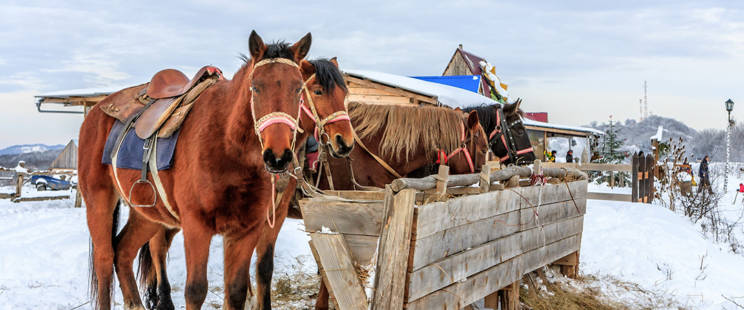Thursday 30th November, 2017

During the colder months we start to switch up our diets, favouring winter warmers such as cottage pie over cold meat salads, and our equine friends are no different. As grazing becomes scarce, horse owners frequently increase the amount of hard feed given to maintain health and condition during the winter. The nutritional needs of horses vary wildly depending on their age and health, the level of training they are in, and whether they are turned out or stabled. Here we look at the feeding requirements of the stabled horse.
What do all horses need?
All horses require access to good quality grazing and fresh water as standard. On top of that, their diet should include carbohydrates, proteins, fats, oils, vitamin and mineral supplements within a hard feed. The amounts of feed will be significantly different between stabled and turned out horses. In the winter, when grazing is reduced, it is even more important to maintain an adequate fibre intake, and adding fibre in your horse’s feed can help to maintain a healthy digestive system.
What does my horse need?
First things first, we need to establish why the horse is stabled. If the horse is simply brought in to the stable at night but is turned out for more than half of the day, then chances are, he is eating a good amount of grazing. Unless he is in heavy training, then a stabled horse will not likely need a large amount of hard feed. That said, the grazing itself will be less dense and less rich, therefore small amounts of supplemented fibre-rich feed will help him to maintain condition.
Special requests
If you have a foaling mare or an injured or unwell horse, then the nutrition needs are going to increase dramatically. Even with regular access to grazing, these horses need higher quantities of quality calorie-dense feed to promote milk production or aid their recovery. You will need to provide a protein-rich diet to replace the proteins that would ordinarily be found in grass, as these proteins facilitate growth and repair within the body.
Elderly care
Veteran horses may also be stabled to make them more comfortable, and so, with restricted access to grazing or poor grazing on offer, they will benefit from a fibre-rich feed. Older horses should not be given high energy, protein rich diets, as their bodies do not need excess protein for growth, and furthermore their systems simply cannot cope with them. A digestible alfalfa with molasses, cod liver oil and small quantities of cool mix is sufficient to keep our less active equines in good condition without them gaining too much weight.
It can be a fine line when trying to balance feeding requirements against training regimes and health conditions. Always be sure to follow the feed manufacturer guidelines for your horse’s size and workload and make any changes gradually to ensure horse’s nutritional wellbeing.